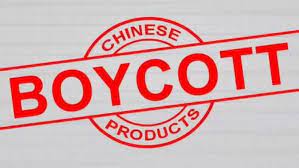Boycott China- In today’s endeavor, my dedication is driven not only by the complexity of the subject but also by the special request of my life partner. When someone dear seeks something, our best efforts naturally follow suit. The subject at hand addresses India’s intricate supply chain links with China and the ongoing efforts to bolster self-reliance. Amidst these dynamics, the anticipation of a resolution to the border standoff prevails. However, the journey to boycott China and its products necessitates collective and gradual strides.

Table of Contents

The Call to Boycott China and Chinese Products: A Step Towards Self-Reliance
In today’s endeavor, my dedication is driven not only by the complexity of the subject but also by the special request of my life partner. When someone dear seeks something, our best efforts naturally follow suit. The subject at hand addresses India’s intricate supply chain links with China and the ongoing efforts to bolster self-reliance. Amidst these dynamics, the anticipation of a resolution to the border standoff prevails. However, the journey to boycott China and its products necessitates collective and gradual strides.
It is no secret that a substantive part of India’s supply chain has its roots in China. Efforts are underway to enhance self-dependency. Meanwhile, we remain confident that the Indian and Chinese leadership will find a lasting solution to the current border impasse. But only our small & gradual efforts can make us win To Boycott China and Chinese Products one day.

We are living in the era where we people are surrounded by 98% of Chinese product around us either the phone you are using or the laptop on which I am writing this even sometimes the air we breath and the food we eat have its roots from china but my opinion to write this blog is not just to boycott Chinese product only even the China too, They stole our festival as well like on Holi colors and balloon similarly on Deepawali Lights & crackers.
While reading this blog just look around you and count the number of products present beside you are Chinese or not, then just think about how directly and indirectly china is taking away our own Indian Identity.
Now we just move forward to understand why we are urging you to boycott China and Chinese products
Boycott Chinese products is a slogan used by Internet campaigns, commonly cited reasons for the boycott include the alleged low quality of products, human rights issues, territorial conflicts involving China, support for separatist movements within China, and objection to more specific matters relating to China. But the most specific reason today is the Pandemic Novel Coronavirus COVID-19 due to this worst virus not only our country even the whole world is facing a crisis of human loss and economic loss.
This Chinese Virus has affected almost half of our country’s population and if still you cannot boycott China and Chinese products then there is no point of writing this much for your awareness of the problem our country facing currently. I agree on the thing that you cannot through your prime price electronics, phones, and laptops but at least you can take a pledge that you won’t buy any more chine products from now onwards.
Recently, India and Tibet have called for a joint campaign to boycott Chinese goods in response to border intrusion incidents allegedly perpetrated by China. We speak about self-dependence and standing up to China. The new government seems to be standing up to it. But where will the government draw strength from if we don’t stop buying things from China?
On the other Side: On the other hand, as the world’s ‘factory’, China is among the largest trade partners of almost all countries. India ha has only a small share in its exports and imports, so its boycott will not hurt China much. But our small efforts can give us a big change, until one country don’t stop buying products from china other countries will not come forward for this movement.
Presently, China’s influence permeates 98% of the products encircling us in India. From our electronic devices to the very air we breathe, Chinese products dominate. Yet, this piece is not just about boycotting products; it extends to boycotting China itself, which seems to have even appropriated our festivals. Colors and balloons on Holi and lights and crackers on Diwali have all been impacted. This contemplation stems from a desire to reclaim our Indian identity.
A resounding call to action echoes – boycott Chinese products. This refrain reverberates through internet campaigns, supported by concerns about product quality, human rights, territorial disputes, and more. Today, the pandemic underscores this call. COVID-19 believed to originate in China, has exacted a global toll on lives and economies, profoundly impacting India. If the weight of this crisis doesn’t propel a boycott, what will?
While discarding high-end electronics might be a stretch, a pledge to abstain from future Chinese purchases is attainable. Recent events, including border disputes with China, have galvanized India and Tibet to jointly advocate boycotting Chinese goods. Amidst talks of self-dependence, tangible efforts are required. Our government’s stance gains strength from our actions.
Nevertheless, China’s role as the world’s manufacturing hub makes it a significant trading partner for most countries. India’s individual impact on China’s economy is limited. Yet, individual efforts accrue to collective change. One nation’s initiative can catalyze a global movement against China’s dominance.
Imagine assessing your surroundings – gadgets, items, tools – how many are Chinese? This introspection underscores the depth of China’s influence on our lives. Transitioning to a scenario where these products stem from alternative sources is both plausible and beneficial. The journey toward self-reliance and a distinct Indian identity commences with such mindful choices.

In this digital era, where internet penetration is deep, the resonance of the “Boycott China” message is amplified. By leveraging digital platforms, we can garner support beyond borders. As this momentum gains traction, other countries may follow suit.

